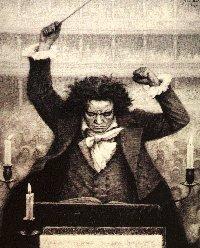 I've managed to work my way through all 9 of the Beethoven Symphonies now. Many of them with multiple exposures in an effort to shed the incredible familiarity (and cliche when passed through the sad prism of contemporary advertising practices) and I plan on revisiting these works more as I cue them up on the portable player.
I've managed to work my way through all 9 of the Beethoven Symphonies now. Many of them with multiple exposures in an effort to shed the incredible familiarity (and cliche when passed through the sad prism of contemporary advertising practices) and I plan on revisiting these works more as I cue them up on the portable player. The 9th Symphony is such a juggernaut. It is the work that springs to mind when one thinks of "symphony." I avoided it to some extent as I re-listened to the earlier Symphonies several times in preparation for this vast accomplishment. This hesitation proved to be unfounded. What an incredible piece! Even my traditional aversion to vocals seemed to fall away with the "Ode" finale that stretches on much longer, and more brilliantly than I'd remembered from all those Western Music History courses.
The 7th Symphony also caught my attention and I plan on reviewing it in more detail as well. I'd expected the 5th to be the most "cliche" riddled and difficult to penetrate. This turned out to not be the case as the opening "duh-duh-duh-DUH!" is seldom a subtle quotation in popular culture and the stunning development and form that follows delivers something deeply compelling well beyond the cheapening effect of so many "secular" applications. I actually found the 6th Symphony the toughest one to crack through the veneer of familiarity as the "Pastoral" melodic phrases crop up in so many lesser contexts that distract from the source. The 4th seemed less appealing than the other eight and sounded like a throw-back to earlier classical traditions in the wake of the innovations found in the 3rd and 5th Symphonies. The long-standing fetish of this symphonic cycle is well-founded. Soon I'll move on to the even richer nourishment to be found in the Beethoven String Quartets.
In the past I've resisted the Beethoven gravity. The Classical and Romantic aesthetics have typically seemed distant to my own sensibilities. But Beethoven stradles the transition between these two eras and the attraction lies in the sound of hearing the mundane, predictable forms and phrases of Classical music breaking down without the excesses of the emotionally heavy-handed chromaticism of late Romanticism. It's this sound and a range of ideas that makes Beethoven such a formidable force in this strain of European music history.


No comments:
Post a Comment